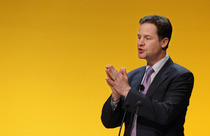 I do feel for Nick Clegg. He’s taken an oppositionalist party into government, and
they hate it. He is politically and psychologically prepared for what goes with power; grassroots LibDems less so. And this brings problems. Yesterday, he was complaining that his party is
“too male and too pale”; but his main problem is that there are too few of any. At the peak of Cleggmania, the Lib Dem had 30 per cent of the the vote. Now it’s 10 per cent in the
polls. If things continue at this rate, he won’t need a ‘ring of steel’ for his next conference: a phone box will suffice. So, what can he do? His speech tries to define a new
word: ‘liberal’. He has this to say:
I do feel for Nick Clegg. He’s taken an oppositionalist party into government, and
they hate it. He is politically and psychologically prepared for what goes with power; grassroots LibDems less so. And this brings problems. Yesterday, he was complaining that his party is
“too male and too pale”; but his main problem is that there are too few of any. At the peak of Cleggmania, the Lib Dem had 30 per cent of the the vote. Now it’s 10 per cent in the
polls. If things continue at this rate, he won’t need a ‘ring of steel’ for his next conference: a phone box will suffice. So, what can he do? His speech tries to define a new
word: ‘liberal’. He has this to say:
‘For the left, an obsession with the state. For the right, a worship of the market. But as liberals, we place our faith in people. People with power and opportunity in their hands. Our opponents try to divide us with their outdated labels of left and right. But we are not on the left and we are not on the right. We have our own label: Liberal. We are liberals and we own the freehold to the centre ground of British politics. Our politics is the politics of the radical centre. We are governing from the middle, for the middle. In government. On your side.’
Now, Clegg might be on to something here. The word ‘liberal’ is not really used in Britain, but it could be. In Blair’s day, many New Labour types defined themselves so. When asked, I define myself as a liberal (in the Manchester sense, not the American sense). To me, being liberal means to mistrust state power, to have faith in the masses and an agenda to empower them. Fundamental to this empowerment is to reduce taxation: money is spent best by the people who earn it.
But, in my view, Clegg has not got it quite right: faith in the people means faith in the market. No other device so effectively empowers the masses, or communicates their priorities. New Labour tried all this Radical Center agenda five years ago (click here to see the 2001 book which kicked it all off) and Alan Milburn wanted to make Labour the ‘Radical Centre’ party. But he lost that argument, and Ed Miliband is now taking a wrecking ball to all that remains of New Labour.
So, as Miliband and his union paymasters turn Labour into the political equivalent of a 1970s tribute band, might Clegg pick up where Milburn left off? He could try. He could win people from right and left (where do the orphaned Blairites go now?) but it would take at least five years. I suspect he has already embarked upon this journey.
As Clegg knows, it’s very possible that the Liberal Democrats might split (I love the idea of a party that is already predated by Kylie’s pop career also being outlasted by it). But its MPs won’t rock the boat and call an election: most are facing oblivion. Nick Clegg could come back as the leader of the reborn Liberal Party. Stranger things have happened.







Comments